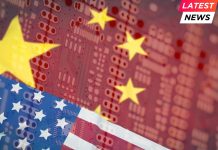South Korean memory giant SK Hynix reported stronger-than-expected earnings for the first quarter of 2025, lifted by continued appetite for high bandwidth memory (HBM) used in artificial intelligence systems.
The company posted revenue of 17.64 trillion won ($12.36 billion), beating analyst projections of 17.26 trillion won, according to LSEG SmartEstimates. Operating income climbed to 7.44 trillion won, far surpassing the 6.62 trillion won forecasted.
Compared to the same period last year, sales soared 42% while profit jumped 158%, underscoring the explosive growth in AI-driven demand. However, the firm did note a sequential slowdown: revenue dipped 11% and operating earnings dropped 8% from record highs in the final quarter of 2024.
A dominant player in dynamic random access memory (DRAM), SK Hynix has become a top supplier of HBM chips — a type of DRAM essential for AI servers — to major tech firms, including Nvidia. A recent Counterpoint Research report placed the company’s HBM market share at 70% by revenue in the first quarter, helping it eclipse Samsung Electronics in the broader DRAM market for the first time. SK Hynix now holds a 36% share globally, edging out Samsung’s 34%.
“This milestone confirms the effectiveness of our strategic focus on premium AI memory products,” an SK Hynix spokesperson said.
To bolster its competitive edge, the company announced plans to construct a new manufacturing plant in Cheongju. The advanced facility, which will produce next-generation DRAM including HBM, is slated to break ground by the end of April, with initial mass production expected in November 2025. The investment will exceed 20 trillion won over the long term.
Despite strong quarterly results, SK Hynix acknowledged that global trade tensions, particularly around potential U.S. tariffs, are contributing to market volatility. The company said it anticipates minimal disruption to AI server-related demand but remains cautious about macroeconomic risks.
Meanwhile, AI integration in personal tech — such as PCs and smartphones — is projected to further fuel growth as new devices equipped with advanced features roll out this year.
Executives also highlighted the expanding AI ecosystem, citing open-source developments like DeepSeek’s R1 model as accelerators of memory demand. With costs falling and sovereign AI initiatives emerging, the company expects investment in the sector to remain strong.
Earlier in April, South Korea’s government increased its support for the semiconductor industry, announcing a 33 trillion won funding initiative — up from last year’s 26 trillion — to help domestic firms navigate the evolving geopolitical and economic landscape.
SK Hynix shares edged down 0.9% in Thursday trading across Asian markets.
Related Readings:








































